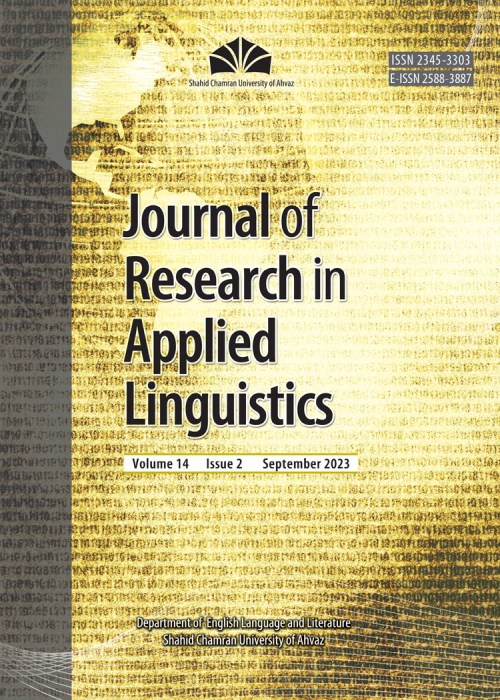Occasional Derivation as the Result of Creativity of Language Personality (On the example of Yu. Petukhov's novel "The Angel of Retribution")
Author(s):
Article Type:
Research/Original Article (دارای رتبه معتبر)
Abstract:
The article is devoted to study of word coinage of the Russian science-fiction writer Yu. Petukhov. The theoretical and methodological basis of the study were the work by Yu.N. Karaulov devoted to the theory of language personality; ideas of E.A. Zemskaya, scientists of Kazan Linguistic School, who present a description of Russian word-production mechanism. The purpose of the study is identifying ways of creating word-building occasionalisms in the novel “Angel of Retribution”, which has not yet been a subject of a special study, and to present creativity as a product, process, ability and personality property. The study showed that word-building is an important component of Petukhov's idiostyle whose neologisms play a significant sense-forming role, contribute to revealing linguistic consciousness type of the writer's personality, his values system. The novel presents the following productive ways of occasional derivation: semantic fusion, morphological addition, prefixation, clipping of the producing basis, affixoid word formation, substitutional derivation. The most common among the occasionalisms are composites created by words fusion and word stems addition. Occasional nouns are most often used in Petukhov’s novel which, on the whole, correlates with general tendencies specific to occasional word formation. The main reason for occasionalisms creation is the need to give names to futuristic objects or phenomena. Their abundance proves that the writer's word-coinage is often experimental, his use of prototype-words and adherence to certain patterns testify to conscious nature of text-creation. The work is topical in terms of clarifying scientific ideas about occasional word formation as a phenomenon of linguistic personality its results contributing to solving problems of lexical derivatology, lexical semantics, neology, language stylistics. Work on the topic seems promising as a further study of word-formation aspects of fiction will allow us to investigate the functional and pragmatic potential of the word-forming resources of modern Russian language.
Keywords:
Language:
English
Published:
Journal of Research in Applied Linguistics, Volume:10 Issue: 1, Spring 2019
Pages:
972 to 980
magiran.com/p2058408
دانلود و مطالعه متن این مقاله با یکی از روشهای زیر امکان پذیر است:
اشتراک شخصی
با عضویت و پرداخت آنلاین حق اشتراک یکساله به مبلغ 1,390,000ريال میتوانید 70 عنوان مطلب دانلود کنید!
اشتراک سازمانی
به کتابخانه دانشگاه یا محل کار خود پیشنهاد کنید تا اشتراک سازمانی این پایگاه را برای دسترسی نامحدود همه کاربران به متن مطالب تهیه نمایند!
توجه!
- حق عضویت دریافتی صرف حمایت از نشریات عضو و نگهداری، تکمیل و توسعه مگیران میشود.
- پرداخت حق اشتراک و دانلود مقالات اجازه بازنشر آن در سایر رسانههای چاپی و دیجیتال را به کاربر نمیدهد.
دسترسی سراسری کاربران دانشگاه پیام نور!
اعضای هیئت علمی و دانشجویان دانشگاه پیام نور در سراسر کشور، در صورت ثبت نام با ایمیل دانشگاهی، تا پایان فروردین ماه 1403 به مقالات سایت دسترسی خواهند داشت!
In order to view content subscription is required
Personal subscription
Subscribe magiran.com for 70 € euros via PayPal and download 70 articles during a year.
Organization subscription
Please contact us to subscribe your university or library for unlimited access!


